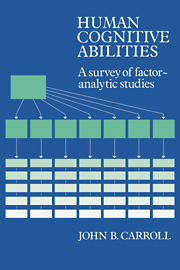Book contents
- Frontmatter
- Contents
- Preface
- PART I INTRODUCTION TO THE SURVEY
- PART II THE IDENTIFICATION AND DESCRIPTION OF COGNITIVE ABILITIES
- Chapter 5 Abilities in the Domain of Language
- Chapter 6 Abilities in the Domain of Reasoning
- Chapter 7 Abilities in the Domain of Memory and Learning
- Chapter 8 Abilities in the Domain of Visual Perception
- Chapter 9 Abilities in the Domain of Auditory Reception
- Chapter 10 Abilities in the Domain of Idea Production
- Chapter 11 Abilities in the Domain of Cognitive Speed
- Chapter 12 Abilities in the Domain of Knowledge and Achievement
- Chapter 13 Psychomotor Abilities
- Chapter 14 Miscellaneous Domains of Ability and Personal Characteristics
- Chapter 15 Higher-Order Factors of Cognitive Ability
- PART III ISSUES
- References and List of Datasets
- Appendix A Codes for Countries, Samples, and Factors
- Appendix B Hierarchical Factor Matrix Files
- Name Index
- Subject Index
Chapter 10 - Abilities in the Domain of Idea Production
Published online by Cambridge University Press: 29 September 2009
- Frontmatter
- Contents
- Preface
- PART I INTRODUCTION TO THE SURVEY
- PART II THE IDENTIFICATION AND DESCRIPTION OF COGNITIVE ABILITIES
- Chapter 5 Abilities in the Domain of Language
- Chapter 6 Abilities in the Domain of Reasoning
- Chapter 7 Abilities in the Domain of Memory and Learning
- Chapter 8 Abilities in the Domain of Visual Perception
- Chapter 9 Abilities in the Domain of Auditory Reception
- Chapter 10 Abilities in the Domain of Idea Production
- Chapter 11 Abilities in the Domain of Cognitive Speed
- Chapter 12 Abilities in the Domain of Knowledge and Achievement
- Chapter 13 Psychomotor Abilities
- Chapter 14 Miscellaneous Domains of Ability and Personal Characteristics
- Chapter 15 Higher-Order Factors of Cognitive Ability
- PART III ISSUES
- References and List of Datasets
- Appendix A Codes for Countries, Samples, and Factors
- Appendix B Hierarchical Factor Matrix Files
- Name Index
- Subject Index
Summary
Whereas creativity involves traits that make a person creative, creating calls upon many resources not intrinsically creative.
David N. Perkins (1981, p. 275)The ability of the individual to produce ideas expressed in language or other media is an important human characteristic. In this chapter, we consider a variety of factors that measure different aspects of such an ability. Many of these factors may be roughly described as “fluency” and “creativity” factors. These correspond generally to abilities that Guilford (1967) described as concerned with “divergent production,” that is, with tasks in which the requirements are relatively unstructured and in which the individual must produce a variety of responses that might meet such requirements. Divergent production is regarded as being opposed to “convergent production,” where the task is highly structured and the problem is only to produce a single “correct” or “best” answer. Some of the factors discussed in the present chapter are of a divergent character, but others are of a convergent character.
In describing this domain as one of idea production, I mean the term idea to be taken in its broadest possible sense. An idea can be expressed in a word, a phrase, a sentence, or indeed any verbal proposition, but it may be something expressed in a gesture, a figure, a drawing, or a particular action. It might be a musical phrase or composition, although there are no instances in our datasets where individuals are asked to produce musical materials.
- Type
- Chapter
- Information
- Human Cognitive AbilitiesA Survey of Factor-Analytic Studies, pp. 394 - 439Publisher: Cambridge University PressPrint publication year: 1993



